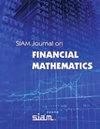Cubature Method for Stochastic Volterra Integral Equations
IF 1.4
4区 经济学
Q3 BUSINESS, FINANCE
引用次数: 0
Abstract
In this paper, we introduce the cubature formula for stochastic Volterra integral equations. We first derive the stochastic Taylor expansion in this setting, by utilizing a functional Itô formula, and provide its tail estimates. We then introduce the cubature measure for such equations, and construct it explicitly in some special cases, including a long memory stochastic volatility model. We shall provide the error estimate rigorously. Our numerical examples show that the cubature method is much more efficient than the Euler scheme, provided certain conditions are satisfied.随机Volterra积分方程的建立方法
本文介绍了随机Volterra积分方程的建立公式。我们首先在这种情况下推导随机泰勒展开式,利用一个函数Itô公式,并提供其尾部估计。然后,我们引入了这些方程的模型度量,并在一些特殊情况下,包括长记忆随机波动模型,显式地构造了它。我们将严格地提供误差估计。数值算例表明,在一定条件下,该方法比欧拉格式有效得多。
本文章由计算机程序翻译,如有差异,请以英文原文为准。
求助全文
约1分钟内获得全文
求助全文
来源期刊

SIAM Journal on Financial Mathematics
MATHEMATICS, INTERDISCIPLINARY APPLICATIONS-
CiteScore
2.30
自引率
10.00%
发文量
52
期刊介绍:
SIAM Journal on Financial Mathematics (SIFIN) addresses theoretical developments in financial mathematics as well as breakthroughs in the computational challenges they encompass. The journal provides a common platform for scholars interested in the mathematical theory of finance as well as practitioners interested in rigorous treatments of the scientific computational issues related to implementation. On the theoretical side, the journal publishes articles with demonstrable mathematical developments motivated by models of modern finance. On the computational side, it publishes articles introducing new methods and algorithms representing significant (as opposed to incremental) improvements on the existing state of affairs of modern numerical implementations of applied financial mathematics.
 求助内容:
求助内容: 应助结果提醒方式:
应助结果提醒方式:


